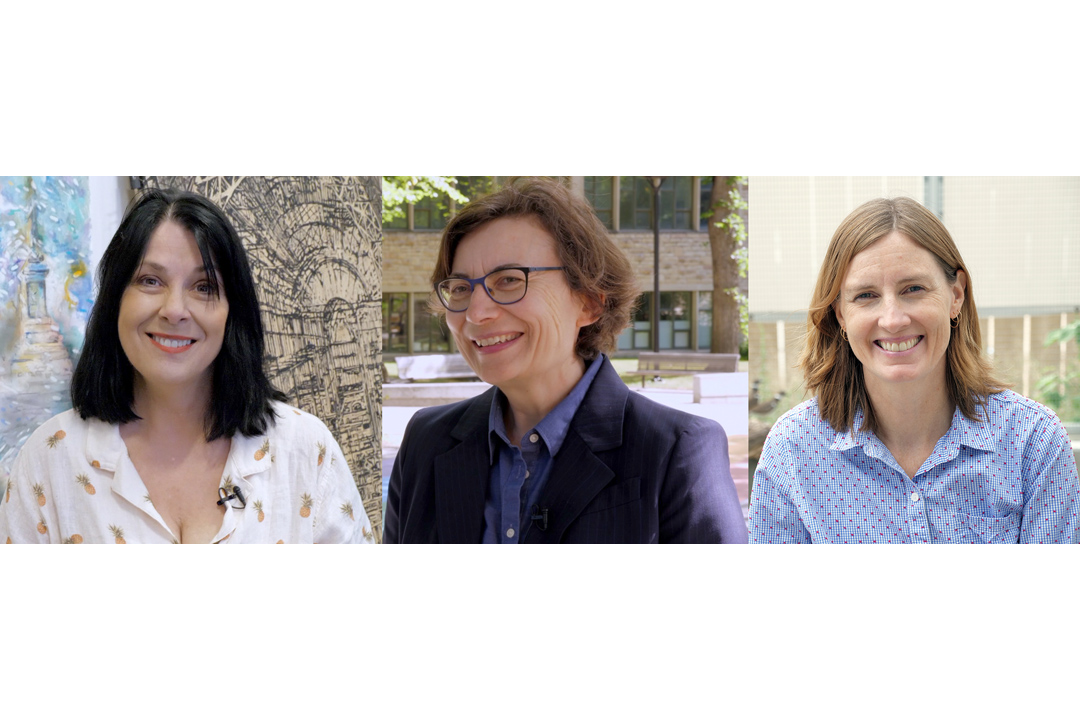
Three USask female faculty members honored by the Royal Society of Canada
Two University of Saskatchewan (USask) faculty members—internationally renowned artist and sculptor Alison Norlen and historian Valerie Korinek—have been named Fellows of the Royal Society of Canada (RSC), the national academy of distinguished scholars, scientists, artists and humanists.
By USask Research Profile and ImpactAs well, the society has named USask biologist Christy Morrissey, a highly regarded international leader in avian and aquatic ecotoxicology, as a member of RSC’s College of New Scholars, Artists and Scientists which celebrates research excellence at an early career stage.
“For these outstanding USask women in research, scholarly and artistic work, election to the Royal Society by their peers is the highest lifetime academic accolade they can achieve in Canada,” said Karen Chad, USask vice-president research.
“We are delighted to celebrate as they take their well-deserved place among Canada’s intellectual leaders, and contribute to the academy’s important work in addressing complex issues that confront us nationally and globally.”
RSC fellows are elected by peers as among the best in their field, and often are called upon to advise governments, non-governmental organizations and Canadians on matters of public interest. All new fellows and members will be presented at an event in Toronto on Nov. 27.
Showcasing expansive creativity, vision
Alison Norlen is widely recognized in Canada and abroad as a compelling contemporary Canadian artist, known for her massive mixed-media artworks, intricately crafted wire sculptures, and bold installations that have captivated audiences across the country and around the world.
Her artwork is held in major collections in Canada including the National Gallery, Winnipeg Art Galley and the Saskatchewan Arts Board. She has more than 50 solo exhibitions, and more than 60 group exhibitions, receiving accolades everywhere from China and Korea to the Netherlands, Brazil, Mexico, and the United States.
Norlen, a USask professor in the art and art history department, has accomplished all this while also earning honours with three distinguished researcher awards, one from USask and two from the College of Arts and Science, as well as two teaching excellence awards.
Norlen said she’s humbled by the honour.
“Looking at some of the past fellows on the roster, especially those in the arts and humanities, it’s pretty wonderful to be included in part of the richness of those Canadian artists and to be considered a peer among them,” she said.
Shaping understanding of feminism, queerness on the Prairies
Valerie Korinek, history professor and vice-dean of faculty relations in the College of Arts and Science, is recognized nationally and internationally as a leading cultural and gender historian, whose unconventional and bold research has challenged accepted narratives about feminism and queerness in 20th century Canada.
Korinek’s recent book, Prairie Fairies: A History of Queer Communities and Peoples in Western Canada, presents a ground-breaking history detailing gay and lesbian activism and community-building in Saskatoon, Regina, Winnipeg, Calgary and Edmonton in the 1960s, ’70s and ’80s. The book has earned three national awards and a Saskatchewan Book Award, unprecedented for a book on the history of sexuality.
Korinek’s award-winning study of Chatelaine Magazine dismantles the popular perception of the publication as a conventional “women’s magazine,” and identifies its advocacy for a feminist agenda on topics ranging from birth control to abortion to sexism, fuelling Canada’s second-wave feminism in the ’50s and ’60s.
Recognized as a strong mentor and outstanding teacher, Korinek has launched a new research project funded by the Social Sciences and Humanities Research Council on the international implications of Canada legalizing same-sex marriage in 2005.
“The recognition by the Royal Society sends a very important message about the value of this kind of research, and its contribution to Canadian knowledge,” said Korinek.
Engaging policy-makers, public on pesticide impacts
Christy Morrissey’s innovative and highly regarded research on the impacts of agricultural pesticides on wild bird populations, migratory birds, and prairie wetland ecosystems has directly influenced policy changes by governments in Canada and around the world on the safety and use of these chemicals.
Her papers on the biological effects of neonicotinoids and other systemic pesticides (that affect the whole plant) are highly cited by other researchers worldwide. Along with this high-impact research, she has contributed to the understanding of pollution and other human activities that threaten birds, attracting wide interest from media and the public.
Morrissey, a professor in both the biology department and the School of Environment and Sustainability, was one of only 29 scientists worldwide asked to join the International Union of Conservation of Nature task force on systematic insecticides.
She formed the Canadian Prairie Agroecosystem Resilience Network, which brings together almost 30 university researchers, nine international organizations, and more than 30 partners from government, non-government agencies, agriculture industry groups and First Nations to redesign prairie agriculture, with the aim of making it more sustainable.
“The election to the Royal Society college is a prestigious recognition, and an opportunity to engage with new colleagues and the public. It provides a platform that enhances the ability to disseminate my research to a wider audience, and also adds credibility,” Morrissey said.

